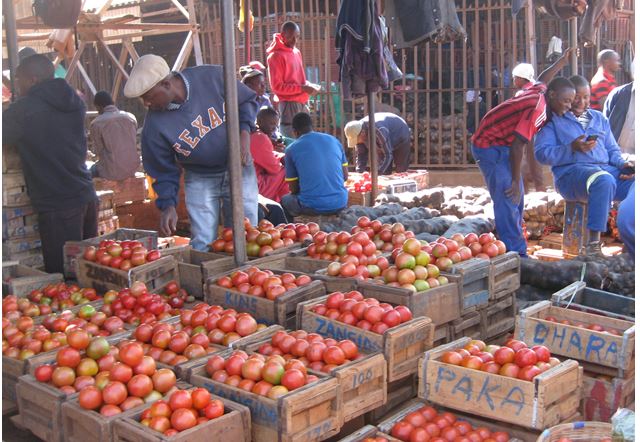If concerns and opportunities of people living at the grassroots of developing countries are to be fully understood, evidence gathering tools have to go beyond questionnaires and other techniques designed in the English language. To the extent that facts and figures represent the hardware, in most grassroots communities, feelings and opinions represent the software which is often ignored although it provides a more realistic contextual picture. While there is a tendency for developments agencies and government interventions to think they can change local people’s mindsets and livelihoods within the lifespan of a three to five year project, the reality is that some people may take longer to change their perspectives. That is where fluid evidence gathering for continuous feedback becomes a powerful resource.

Need for coordinated production
For most African agricultural communities, the challenge is no longer whether people are able to produce crops and livestock but how they can do so in coordinated ways so that gaps can be visible to the market and policy makers. It is taking long for some farmers to realize the futility of doing commercial bean production in small gardens whose outputs may not even be enough to feed a single household. Evidence is critical in revealing some of these issues including demonstrating how smart agriculture should be informed by the performance of different commodities on the market.
Rural development cannot be achieved without a system for pulling and aggregating evidence. A culture of collecting and interpreting evidence enables investors interested in the agriculture sector to make investment decisions through looking at the capacity of different areas to produce and supply certain commodities consistently. The main reason outside investors can see opportunities ahead of local entrepreneurs is because locals are often too close to the situation to imagine how else local resources can be exploited. Evidence is also essential in coordinating different actors in the same district. This will prevent duplication of effort and misallocation of resources. Data can also reveal consistency in supply from one area to different markets. This will inform investors on where to set up processing machinery and the size of the machinery. If there is no data, a processor can set up a processing plant that requires more than 50 tons of tomatoes per day when local production can barely afford 10 tons a week.
More reasons for fluid data collection methods and tools
Methods and tools currently used for baseline surveys and other forms of inquiry are useful to some extent. A major limitation is that these tools tend to be static such that they collect once-off information. In the fast-moving African agricultural and SME sectors, there is need for fluid data gathering tools, linked to ICTs in ways that enable real-time learning and adjustment. While once-off data collection tools may work for seasonal crops like maize, tobacco, groundnuts, cotton and coffee, they are not suitable for most horticulture commodities that are now produced all year round and sequentially. This is where tools that support fluid data gathering and consolidation are badly needed. Most horticultural food crops comprise a collective nutrition basket which consumers do not want to miss. As one horticulture commodity is harvested, another one is being planted. One crop is getting out of the season, another one is entering the market. Without evidence it becomes difficult to track the behavior of these commodities that form a nutrition basket so that it becomes possible to see periods when nutrition is not balanced for different consumers and communities.
How data is key in dealing with different perishability levels
Due to different levels of perishability, horticultural commodities have to be prepared for the market in different ways. Small grains and maize can be stored in granaries for a while until the market improves but the same cannot be done with horticultural commodities like tomatoes which, when ready for harvesting, it cannot be postponed. Negotiations with the market has to be a continuous process and this means evidence has to be continuously gathered and shared with the market.
While there might not be too much variety in terms of standards and specifications in field crops like maize, horticultural commodities are subject to diverse quality parameters, standards and specifications. Some consumers prefer a specific variety of pepper. A group of consumers may prefer under-ripened tomatoes and bananas while some may prefer over-ripened. Managing all these different preferences may not be successfully done without disciplined evidence gathering and sharing. All these feedback mechanisms and advisory services require a rapid response system based on fluid evidence.
Rationalizing resource utilization
Better economic returns can be achieved if there is continuous data showing how water, soils and labor are being used in producing diverse commodities by different areas. This will also show how better prices translate to better incomes. Smart and continuous data collection can also reveal volumes of commodities consumed locally and any space for foreign markets. This will prevent cases where an export drive deprives local people of better nutrition. A resilient culture of collecting evidence can also show how horticulture complements other interventions like national maize production schemes. Once evidence is available, it will show how absence of maize may not mean starvation because many families will be resorting to tubers and different kinds of vegetables as coping mechanisms unlike depending on maize alone.
Marginalized communities have diverse and complex information and knowledge needs as well as existing knowledge and understanding that can positively contribute to the development sector. Systematic ways of collecting and using evidence can show the extent to which programmes with an excessive focus on women and youth are not merely using women and youths as instruments for achieving broader national socio-economic objectives. To this end, data gathering methods and tools should reflect the diversity of issues affecting the status of farmers, women, youths, elderly people and others in communities.
charles@knowledgetransafrica.com / charles@emkambo.co.zw / info@knowledgetransafrica.com
Website: www.emkambo.co.zw / www.knowledgetransafrica.com
eMKambo Call Centre: 0771 859000-5/ 0716 331140-5 / 0739 866 343-6
